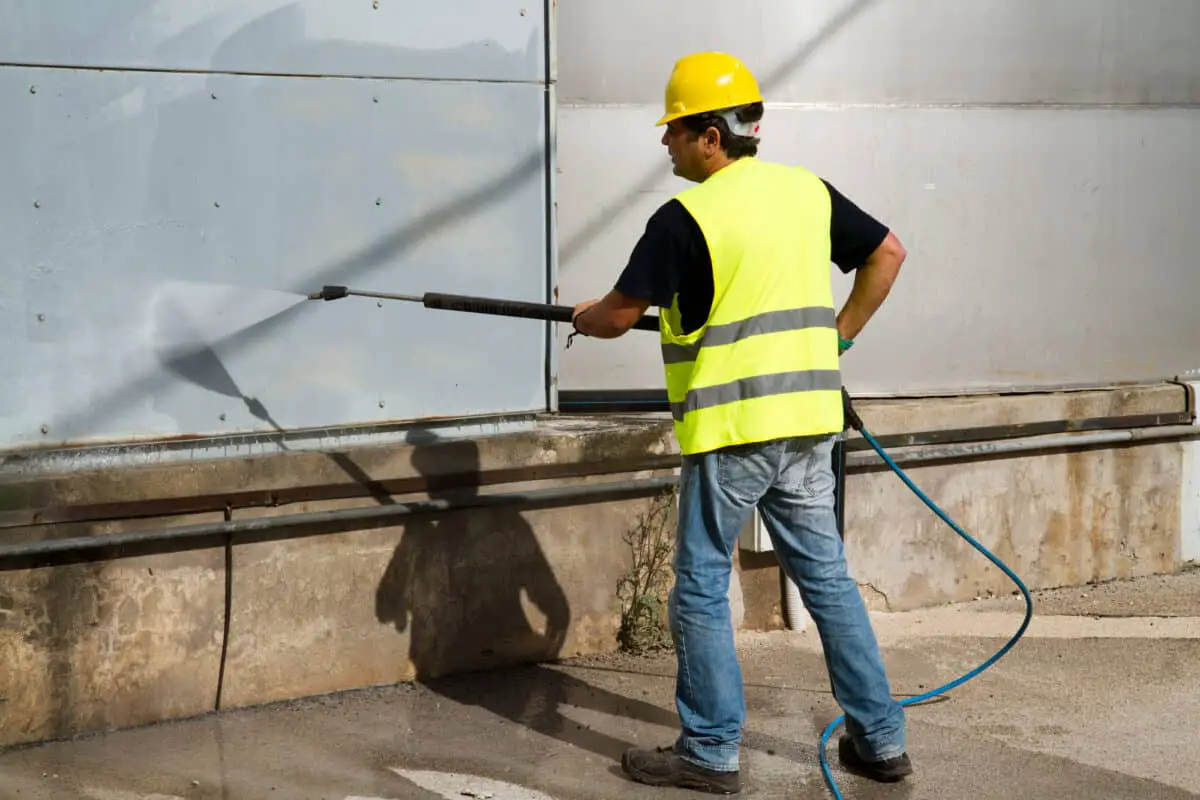Some pressure washer safety tips include wearing goggles, ear protection, and a mask and avoiding electrical and other hazards.
We have 11 total tips that will help keep you safe.
Pressure washing is an effective and fast way of cleaning various surfaces.
It’s important to remember that machines can be dangerous if not used correctly.
Here are 11 safety tips you should consider when using your pressure washer.

Related Reading: Is Using a Pressure Washer on Your Car Safe? Blast Away Dirt
Table of Contents
Importance of Pressure Washer Safety Tips
It is important to remember that pressure washers are powerful machines that can cause injuries.
We often underestimate the force of the water from the nozzle, mainly if we use a smaller one with high pressure.
Besides the water pressure, debris can fly up and hit unprotected skin.
I got some abrasions on my skin while using a pressure washer to clean the patio.
I always wear protective goggles to avoid small rocks and debris getting into my eyes.
I’ve been fortunate to avoid serious injuries, but I attribute some of this to safety measures.
I want to share these pressure washer safety tips with you.
Related Reading: CDC Pressure Washer Safety
1. Wear Safety Goggles
When using a pressure washer, be cautious of airborne debris such as stones, concrete, mud, and grit.
This can be a hazardous situation if you are not wearing eye protection.
Safety goggles or glasses protect your eyes from debris, reducing the risk of eye injury while cleaning equipment.
When washing a deck, small wood pieces may fly off in various directions.
Eye protection is one of the most straightforward pressure washer safety tips to follow.
Related Readings:
- What Size Pressure Washer To Clean Concrete
- Best Pressure Washer Deck Cleaning Tips for Stellar Results
Popular Safety Goggles on Amazon (Affiliate Link)
2. Wear Ear Protection
Pressure washers fall under the garden equipment category, producing noise between 75 – 105 decibels.
This is why many homeowners prefer electric pressure washers to limit noise levels while washing their homes.
Extended use of this equipment may lead to hearing damage, and sound protection is advised.
This is similar to using gas-powered lawnmowers, edgers, or hedge trimmers.
Related Readings:
- The Ultimate Guide to Affordable Pressure Washers: Cleaning on a Budget
- How Often Should You Pressure Wash Your House?
Popular Ear Protection on Amazon (Affiliate Link)
3. Dust Mask
The use of a pressure washer can create dust in dry areas.
While cleaning the pathway, you may kick up some loose dust, especially if you spray around the edges of the grass and dirt.
It is recommended to wear a dust mask to prevent inhaling any dust particles.
It is essential to ensure that the dust mask you use meets your country’s safety standards, as there are many variations available in the market.
Popular Masks on Amazon (Affiliate Link)
4. Tripping Hazards
Pressure washers require a water supply hose and an electrical cord, depending on the type of washer.
The pressure washer wand connects to a flexible hose that varies in length.
When power washing, it’s easy to focus on the task and not pay attention to where you’re walking.
With two or three cords along the ground, you can easily be distracted by the pressure washing and not see the tripping hazards.
This area can be dangerous.
Some may not think of tripping hazards as one of the safety tips for a pressure washer.
We recommend taking breaks and checking for hazards like cables and hoses.
Remember to keep the cords and hoses away from your walking path while cleaning if you can.
5. Electric Hazards
Electric pressure washers require a power supply since they must be plugged in.
Combining water and electricity can result in severe injury or death.
When using a pressure washer, plug it into a waterproof outdoor socket or keep it away from any moisture.
Ensure your outlet is an outdoor Ground Fault Service Interrupter (GFCI) or GFCI-protected outlet that will trip should there be an electrical surge.
Avoid spraying water on any plugged-in and turned-on appliances to prevent damage and ensure safety.
Water conducts electricity quickly, so always unplug equipment and turn off power before cleaning.
6. Detergent Storage
Some pressure washers allow you to make a mixture of detergent and/or bleach to clean even stubborn marks and dirt.
Unfortunately, detergents and bleach are highly toxic and can cause serious harm if ingested, including damage to equipment, illness, or death.
You should always ensure that your detergent/bleach is appropriately sealed and stored in a locked cupboard or high up to prevent children from accessing it.
7. Proper Nozzle Handling
Pressure washers can cause serious harm, with their high pressure of up to 2400 PSI.
If you are using a 0-degree nozzle, the focus stream can be highly concentrated.
It’s powerful enough to damage concrete or even skin.
It would be best if you never aimed a pressure washer at people or animals since it can cause blindness, burns, or life-threatening injuries.
Related Readings:
- Choosing the Best Pressure Washer PSI: Maximize Your Cleaning Power
- Pressure Washing Concrete: Debunking Myths and Expert Insights
8. Keep Serviced
It is essential to keep your pressure washer clean and serviced to prevent malfunctions, such as low pressure, or damage to the machine and its hoses.
The hose between the pressure washer and wand is often reinforced with braided steel to prevent damage from being stepped on or run over.
The braided steel can sometimes become exposed if the hose hasn’t been cleaned properly.
To ensure proper functioning, it is important to clean and inspect the inlets and outlets regularly for any faults.
These points are subjected to high forces of pressure.
If you notice any worn rubber washers, replace them immediately.
Related Readings:
9. Danger of Pressure Washing on a Ladder
Using a pressure washer while standing on a ladder is dangerous due to the extreme forces they can exert.
Using a pressure washer at close range can cause a person to stumble.
A pressure washer can easily throw a person from an elevated surface.
If you have to access an area higher up, you should use scaffolding erected by a specialist.
You can also get extensions for certain pressure washers, which allow you to reach higher areas or find the right nozzle to reach those further spots.
Remember, the rungs can also become wet, causing a slipping hazard.
10. Confined Space
It is dangerous to use diesel or gas-powered pressure washers in a confined space, as it can cause severe illness or death.
All gas-powered engines have exhausts that produce carbon monoxide (CO), which can be lethal.
If you are using a pressure washer in a confined space, ensure good airflow by opening windows and doors.
If this is impossible, use an electric pressure washer or approved breathing apparatus.
Always inform others when pressure washing in confined spaces and take regular breaks.
11. Alert Others
Please be sure to inform others when you are using a pressure washer.
This can be accomplished by placing signs in the washing area, particularly around blind spots.
Using hazard warning tape, you can create a “no go” area around the washing area.
Take into account the distance of objects that could be projected.
Related Reading: Can You Use a Pressure Washer Without a Hose?
Final Thoughts on Pressure Washer Safety Tips
Pressure washers are readily available at hardware stores, but can be dangerous if not used properly.
A pressure washer can be dangerous if not used safely by the operator.
Remember to follow these safety tips when using your pressure washer to ensure a safe and injury-free experience.
To ensure the safe usage of your pressure washer, always consult the safety manual provided by the manufacturer.
If you find any issues with the pressure washer, do not use it until it gets fixed by an authorized technician.
Safety First Always!!!
Enjoy living the outdoor life!!!
